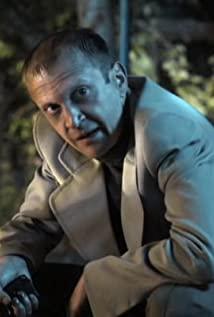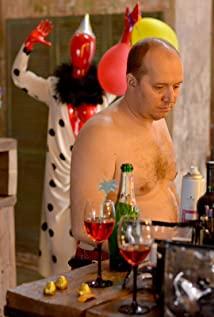"Ask, and it will be given to you. Seek, and you will find. Knock, and it will be opened to you. For whoever asks, receives. Whoever seeks, finds. Whoever knocks, it will be given to him. Open the door."
- Matthew, 7:7-8 Was
salvation a fluke or a revelation?
At first glance, the answer is obvious. "Do you still need to talk about these two things? When we are three-year-old children? Can't even tell the difference?" People who think like this are too arrogant. If he still insists on doing this, then he is really fooling himself.
The Russian director Pavel Longin (Павел Лунгинь) certainly would not agree with this answer. He intends to use a story to tell the audience in the movie "Island of Lonely" (Остров) - distinguishing between revelation and luck is the key to faith.
The story begins with a murder. In 1942, it was when the Soviet Northern Fleet fought hard against the German fascists. Gulag prisoner Anatoly, led by Captain Tijon Petrovich, drives a tugboat to transport coal. At night they encountered German patrol ships and were forced to stop. The two hid in the coal pile. However, after the German army opened fire with wickedness, Anatoly, who was hiding in the coal pile, was frightened and jumped out. Under threat of death, Anatoly confessed to the captain. The captain who fell into the enemy's hand was very calm and calm. Facing the muzzle of the Germans, he picked up a cigarette, lit it, and sat on the side of the boat. At this time, the German officer asked Anato to use the Luger pistol to kill the captain, otherwise it would cost him his life.
Before the Sufi-style choice, Anatoly succumbed. He raised his gun and fired in a frenzy, and the captain fell into the water, not knowing whether to live or die. The German officer did not break his promise. Anatoly survived and survived, and drifted to a nearby desert island, where the monks saved his life. But from then on a curtain of ignorance fell, and the game opened.
Anatoly, who believed that he killed his comrade with his own hands, was burdened with unease in his conscience and lived a crazy and sloppy life. He lived in the convent's boiler room and slept not on a bed but on a pile of coals. Every day, he pushes his cart along the wooden trestle to dig coal from the rotten tugboat stranded on the island. Every day, after finishing these tasks, he would definitely row on a boat to a more remote island nearby, leaning over the earth in despair and repenting and praying, "Lord, please don't abandon me, please help me." He said. Candles are also lit at the Red Horn (the shrine dedicated to the Savior in the house of Orthodox believers) to pray for the salvation of the soul of the warrior Tijon Petrovich.
But after each such repentance and self-torture, he did not find peace. Therefore, Anatoly was always unable to observe the sacramental rules peacefully in the Mass and worship occasions in the monastery, and looked more like a lunatic. His heart could not be at peace.
The days just passed by. Fast forward to 1976, the young man of that year has been carved into a bearded, sunken eye socket, and an old, rickety old man by the hard life of a monk. Years have polished him to be ordinary and quiet, and his life style has been the same for decades, making the monks in the monastery who covet comfort feel ashamed in front of him. Gradually, Anatoly gained a reputation, and it got louder and louder. He is now called a saint by monks and devotees alike.
If it is an ordinary person, now he can sit back and enjoy everything and be satisfied with the moral order. After all, if you think about it carefully, it is not certain whether the captain is dead or alive, because no seeing is believing! Could it be that after so many years of ascetic cultivation, is it not enough to atone for sin? Even if there is no atonement, isn't the sin a little less? The one who killed was the Anatoly from before, not the Anatoly from now! But the priest still couldn't let it go. He always said that he had sinned deeply and had killed people, which was unforgivable. However, no one around him believed him, they only thought that he was acting as a god or making up stories and pranks.
Conscience has always tormented the priest. He couldn't let go of that personal responsibility. He longed to unload this spiritual burden and obtain liberation. However, the hope for liberation fails, but the achievement is the tug-of-war and battle in the heart. It was this torture that gave Father Anatoly a different perspective. He knew that he was regarded as a saint and loved by others, but it was an accidental windfall to atone for his sins. Pure fluke! Therefore, he always avoided this reputation and was unwilling to be this saint. He also said to Father Job, "I feel that my soul stinks."
People have the same heart and the same reason, and the priest also observes the people around him from this angle. Sure enough, those who tried to rely on luck came. At first, it was a girl who was pregnant out of wedlock. She was afraid of carrying an unclean reputation and wanted to have an abortion quietly, but she couldn't make up her mind. The priest didn't want to talk to her, but she actually took out the money. The priest was angry, "Put those things away, you fool. Don't let me see the money again!" The priest was even more angry that she actually tried to get away with killing a life. Anatoly taught the girl that if she didn't give birth to a child, no one would want it, "This is destined by God. You have to give birth to a child, and then you will have peace of mind. Otherwise, you will curse yourself for the rest of your life." The conclusion is that there should be no murder - this is the law of Moses. In the end, the girl left calmly, dispelling the idea of getting away with it.
The second person who came to the door was an old lady on a collective farm. Her husband Mikhail was with her for only six months before he was killed in the Great Patriotic War. She said, "I love him to this day," so she asked the priest to intercede for her deceased husband, who always appeared in her dreams and moaned in pain. The old lady wanted Mikhail's soul to rest in peace so that she could free herself. However, Father Anatoly played a prank and told the old lady that Mikhail did not die but went to France to see her before he died. Unexpectedly, the old lady categorically refused. "It's a capitalist country, and they won't let me go!" She couldn't abandon everything in the Soviet Union, she couldn't abandon the big fat pig she raised at home. The priest asked back, "Do you love your husband? If you do, then do what God ordained." However, the old lady left with a wheeze.
The third begging for the priest was a mother who wanted her son Vaneshka, who is disabled with two legs, to stand up. The priest was moved by the child and prayed for him that the child could actually get rid of the crutches and struggle to stand and move. The poor mother was thinking of going home. Anatoly asked her to stay on the island and take communion for Vaneshka the next morning to ensure the child's recovery. But the priest did not expect that the poor mother would not do this for her child. She insisted on going home that day anyway, because she had to go to work tomorrow or she would lose her job in the Engineering Design Bureau. The boat on the island set sail, and the priest rushed into the sea desperately and took back Vaneshka, "Which is more important? Your son or your job?" "Even if you don't think about yourself, you have to do it for your son. Think about it!" But the mother replied, "Let him be lame then."
All these people are doing one thing: trying to deceive God's salvation in a cunning way. No matter how pitiful they are, they are carefully calculating the price they will bring in exchange for salvation. God can be trusted only when it is not at the expense of some of my benefits and interests. These three petitioners all thought carefully about their personal interests. They thought that by concealing their true intentions, they could defraud the priest to obtain blessings, and to use the priest to deceive the grace of God at the least cost. It was just a fluke. As we all know, the magic weapon that all gamblers rely on is luck. They can't completely let go of themselves, so they pretend to believe, but they are actually trying to beat God's idea. When the priests exposed their hypocrisy, some people repented, some regretted it, and some people were still obsessed.
After the petitioners were sent away, the priest's life was business as usual. Until one day, a naval commander came to the island with his mad daughter, Nascar. He told Father Anatoly that Nasca was mentally ill because her husband was killed in a submarine accident, and there was no cure for seeking medical treatment. The priest took pity on the young widow, and asked her and her father's names. Who knows, Nascar said, "My father's name is Tijon Petrovich." This is the captain who killed himself more than 30 years ago!
The real test came. How would someone like the three callers react? It doesn't take much to know that they will feel deeply worthless, and they will complain to the point of anger. Maybe jumping up, pointing angrily at Tijon Petrovitch's nose and scolding: "You're not dead! Why didn't you let it be known earlier that you're not dead? You made me waste thirty-four in vain. This year on this broken island! I can't eat well, sleep well, and have a bad conscience every day, I've had enough." Yes, now the truth is revealed, I just shot out of desperation, and I myself Just innocent. Besides, it doesn't really kill you, it's even more innocent. Perhaps the man would still be resentful, would grab Tijon Petrovich by the neck, demand an apology, and scolded: "Why don't you die? So that all my prayers and repentance may lead to true salvation! Now you have come and ruined it all. The sin I thought was committed never happened. It turned out that my prayer was a vain self-deception! It turns out that all this has nothing to do with the grace of God, it is just a coincidence You ruined my salvation!"
Maybe there will be another reaction. Since you have already cultivated and become a saint, why not just make mistakes and enjoy the name of a saint brought about by thirty-four years of penance? At least it looks no different from being saved by true faith. As long as you don't say it, you don't know, he doesn't know, and it's over? Then you can continue to eliminate disasters for people and pray for blessings.
Father Anatoly, however, remained silent. "I'm so glad he's a commander," he said to Nascar. He told Tijon Petrovich that Nascar was only infested with demons. Then he rowed with Nascar to the little island where he went to repent every day. Kneeling in the snow, he prayed with all his heart for her and for himself:
"In the name of the Father, the Son and the Holy Spirit, Lord Jesus Christ, we shall succeed. The power of God shall grow strong, and his enemies shall vanish. , vanishes like smoke, like wax melts before fire. The devil will perish before those who believe in God, and among those who cross the cross, and say cheerfully 'O precious life-giving cross, drive away the devil !' Destruction in front of the people. All holy and life-giving cross of God, with Our Lady and all saints, help me for ever and ever. Amen!"
After the prayer, Nasca fainted. After waking up, she finally found peace and let go of her resentment against the world - this is the real demon in her heart. After returning to the island where the monastery was located, the priest invited the naval commander into the boiler room. They recalled the experience of the year candidly face to face, and Tijon Petrovich faced it all and forgave the shot of that year.
Everything is relieved. Anatoly didn't think it was worthwhile to stay on the isolated island for 34 years, neither complaining, nor anger, nor resentment. He brushed off the murders he had committed in the world, but he was not proud of the 34-year fluke virtues brought about by this incident. After Tikhon Petrovitch left with his recovered daughter, Father Anatoly pondered everything silently. Finally, he asked Father Job to help carry the coffin, put on a white robe and lay in it barefoot. At this time, there was a profound dialogue between him and Father Job:
"Please tell Father Filaret that Anatoly, the servant of God, has passed away."
"Aren't you afraid of death?"
"I am not afraid of death, I am afraid of standing Before God. My sins trouble me."
"Then how am I going to live?"
"We're all sinners. Live the way you can. Just don't make too many mistakes. All right, enough, enough said. Come on, my dear. God is with you."
Father Job rang the bell to announce the saint's death. At the last moment, Father Anatoly prayed peacefully: "God, accept my sinful soul." He completely and completely confessed the universal sin of mankind, and also completely and completely achieved the faith. Finished speaking, died peacefully. Father Job sails with Anatoly's body and cross to the isle of Anatoly's usual repentance, and as the boat sails to the other side, the film ends in this symbolic scene.
Human beings often regard individual faults as all their sins, thinking that by atonement for individual sins, they can achieve a pure and innocent body, thus obtaining final redemption and living in this world with peace of mind. This belief is a complete misinterpretation and perversion of faith and original sin, and a great greed. It seeks to base redemption on a fluke and a fluke of cleanliness. It does not imply devout belief in God, but regards unconditional trust in God and unconditional recognition of one's own sinfulness as vain. A fluke-style redemption does not require revelation, but only calculation, so it is also a false redemption and a deception.
However, not everyone can easily distinguish the two. Because people are afraid to face the embarrassing and shocking fact that we are guilty. Swapping individual sins for the original sin is a way for people to confuse revelation with luck and deceive God intentionally or unintentionally, showing that people are unwilling to bow their heads before God. Human beings are so arrogant that they put themselves before the power of God. When man does this, he simultaneously reduces the existence of God to nothingness. Although he was still chanting the name of God, he was just pretending. When this fluke-based self-deception is exposed, what is exposed is false faith. People often look at the invisible and unnamed divine will with their self-proclaimed ingenuity. Because of a lack of trust in the reality of salvation, people seek flukes of every kind. For example, Father Filarete of the monastery portrayed in the film. He was fascinated by ritual as the perfect display of divine providence, and he often corrected Father Anatoly's unorthodox movements during worship. In fact, doing this is just trying to get away with the opportunism of faith that is not wholeheartedly devoted. After Father Anatoly left, he realized that he had no faith at all.
Is to choose fluke or choose revelation? How can we distinguish between the two? The answer is true faith, letting go of human arrogance, admitting original sin, and honestly following the way of the Savior. That's why Jesus said to his disciples: "If anyone would come after me, let him deny himself, take up his cross and follow me." (Matthew 16:24) The real revelation is the truth of his own sinfulness. Unconditional acceptance, and unconditional trust in salvation. This is both revelation itself and the way in which revelation can be opened to people. When all the disguise is removed, the simplicity and directness of the revealed truth can be seen directly, just as Father Anatoly confessed when he was dying. This acceptance and trust is universal and absolute, the same for everyone, and therefore necessary, and it excludes all special, accidental, flukes and virtues. For the necessary original sin, there is the necessary salvation. Only by believing in salvation as a necessity can be justified by faith.
After Jesus was resurrected, he said to his disciple Thomas, "You believe because you have seen me. Blessed are those who believe without seeing." (John 20:29) The authenticity of salvation is the unseen holiness. This principle is valid only for the devout. Faith is not faith if it is not necessary.
What Lonely Island opens to us is a sincere exploration of the essence of faith.
View more about The Island reviews











